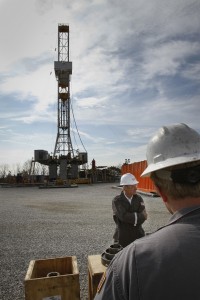Report: Drilling Boom Boosts Household Incomes by $1,200 A Year
-
Marie Cusick

Michael S. Wirtz/Philadelphia Inquirer/MCT
A gas drilling rig near Waynesburg. Wirtz/Philadelphia Inquirer/MCT
In a new report released today, the global consulting and research firm IHS finds the nation’s shale drilling boom boosts Americans’ household incomes by an extra $1,200 a year.
The report also predicts by the end of the decade, the nation’s unconventional oil and gas industry will bring in more than $125 billion in federal and state tax revenues.
The report entitled, “America’s Energy Future: A Manufacturing Renaissance” is the third volume in a series by IHS examining the economic impact of the shale boom.
More from Bloomberg:
Along with jobs at well pads and production facilities, the energy boom will increase employment throughout the economy, said [John Larson, vice president of economics and public sector consulting for IHS].
By 2020, jobs that can be attributed to higher oil and gas production will reach 3.3 million, according to the report.
Disposable income will rise as a result of lower energy prices, adding $2,700 per household in 2020 and more than $3,500 by 2025. Factors that could restrict production — an extension of fracking bans such as the one in New York state or stricter environmental regulations — would result in a rapid decline in the economic benefits, Larson said.
Industry groups such as the American Chemistry Council, America’s Natural Gas Alliance, the American Petroleum Institute, the Fertilizer Institute and the U.S. Chamber of Commerce provided funding for the report.
According to the most recent figures from Pennsylvania’s Department of Labor and Industry there are 30,369 people employed in the state’s Marcellus shale industry and another 209,105 employed in ancillary industries.
The state’s natural gas production has surged to 1.4 trillion cubic feet during the first half of 2013, according to the most recent data released by the state Department of Environmental Protection. The numbers show a 57 percent increase in gas production compared to the same time period from last year.
In a recent industry survey, the Marcellus Shale Coalition estimates there will be 4,000 new hires will be made in 2013, with the biggest share of jobs going to Southwestern Pennsylvania, followed by Ohio.
















